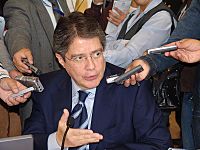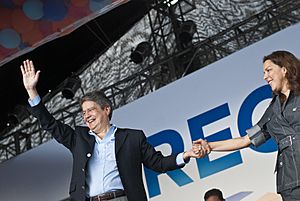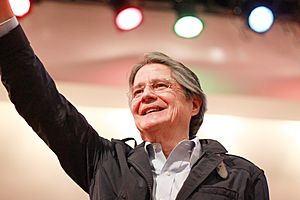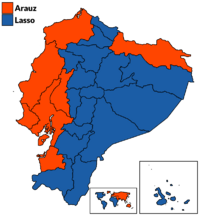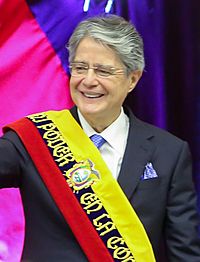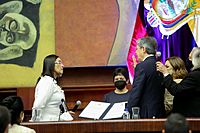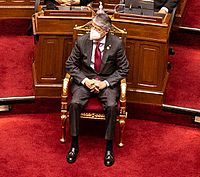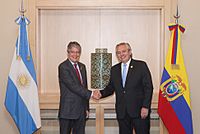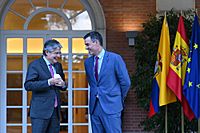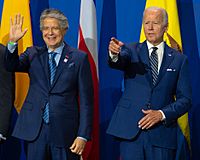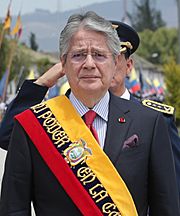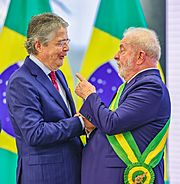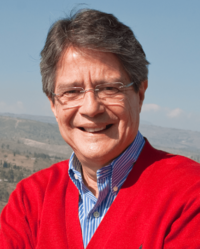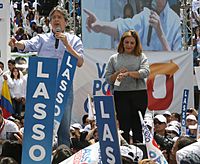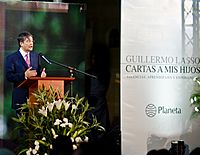Guillermo Lasso facts for kids
Quick facts for kids
Guillermo Lasso
|
|
|---|---|
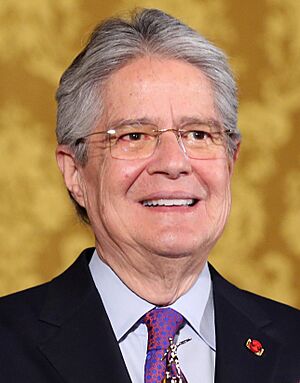
Lasso in 2022
|
|
| 47th President of Ecuador | |
| In office 24 May 2021 – 23 November 2023 |
|
| Vice President | Alfredo Borrero |
| Preceded by | Lenín Moreno |
| Succeeded by | Daniel Noboa |
| Ecuadorian Itinerant Ambassador | |
| In office 15 January 2003 – 15 April 2003 |
|
| President | Lucio Gutiérrez |
| Preceded by | Office established |
| Succeeded by | Office abolished |
| Minister of the Economy | |
| In office 17 August 1999 – 24 September 1999 Serving with Ana Lucía Armijos
|
|
| President | Jamil Mahuad |
| Preceded by | Position established |
| Succeeded by | Position abolished |
| Governor of Guayas | |
| In office 10 August 1998 – 17 August 1999 |
|
| President | Jamil Mahuad |
| Preceded by | Guido Chiriboga Parra |
| Succeeded by | Benjamín Rosales |
| Personal details | |
| Born |
Guillermo Alberto Santiago Lasso Mendoza
16 November 1955 Guayaquil, Ecuador |
| Political party | Creating Opportunities |
| Spouse |
María de Lourdes Alcívar
(m. 1980) |
| Children | 5 |
| Education | Pontifical Catholic University of Ecuador (dropped out) |
Guillermo Alberto Santiago Lasso Mendoza (born 16 November 1955) is an Ecuadorian businessman, banker, and politician. He served as the 47th president of Ecuador from 2021 to 2023. He was the first conservative president in Ecuador in almost two decades.
Lasso held several important roles before becoming president. He was the Superminister of Economy in 1999 and Governor of Guayas from 1998 to 1999. In 2003, he was briefly Ecuador's Itinerant Ambassador. Outside of politics, Lasso was the CEO of Banco Guayaquil, a major bank. He became a well-known critic of former President Rafael Correa.
Lasso believes in free markets and lower taxes. He founded the Creating Opportunities Party in 2012. He ran for president three times. In 2013, he came in second place. In 2017, he narrowly lost to Lenín Moreno. In his third attempt in 2021, he won the election.
During his presidency, Lasso focused on COVID-19 vaccination efforts and economic help. This included tax changes for wealthier people and working with the International Monetary Fund. However, rising food and fuel prices led to protests across the country. In May 2023, Lasso dissolved the National Assembly, leading to new elections where he did not run. Daniel Noboa succeeded him.
Contents
Early Life and Education
Guillermo Lasso was born in Guayaquil, Ecuador, into a family that faced financial challenges. He is one of eleven children. At age 15, he started working to pay for his high school education at Colegio La Salle. After high school, he began studying economics at the Pontifical Catholic University of Ecuador in Quito, but he did not complete his degree.
First Jobs
In 1970, Lasso started working part-time at the Guayaquil Stock Exchange. He later worked as an assistant at a collection agency. In 1972, he joined a financial company called Cofiec. His first company, Constructora Alfa y Omega, was founded with his older brother in 1978 when Lasso was 23 years old.
Family Life
In 1977, Lasso met María de Lourdes Alcívar. They married in 1980 and have five children: María de Lourdes, Juan, Guillermo Enrique, Santiago, and María de las Mercedes.
Business Career Highlights
In the 1990s, Lasso became the head of operations for Coca-Cola in Ecuador. His job was to help the company recover financially. He also served on the boards of directors for Coca-Cola and Mavesa. He was also chairman of the board for the Guayas Transit Commission.
Leading Banco Guayaquil
In 1994, Lasso became the CEO of Banco Guayaquil. He started the Bancos del Barrio program, which helped local shopkeepers work with the bank. This program was praised for helping more people access banking services. Lasso left his role as Executive President in 2012. He is the largest shareholder in Banco de Guayaquil.
Helping During the Pandemic
In March 2020, Lasso started the "Saving Lives" initiative. This effort raised US$8 million to buy medical supplies and equipment for Ecuador during the COVID-19 pandemic.
Political Journey
In 1998, Lasso was appointed Governor of Guayas. During this time, the government privatized many public companies.
Economic Minister
Ecuador faced an economic crisis in 1999. Lasso was temporarily appointed as the Superminister of the Economy. He worked with the International Monetary Fund to get economic support for the country. He also helped coordinate the government's response to the crisis.
Ambassador Role
In January 2003, President Lucio Gutiérrez named Lasso as Ecuador's Itinerant Ambassador. He held this position for a few months. Before his first presidential campaign, Lasso founded the Creating Opportunities party. This party aimed to challenge the government of Rafael Correa.
Presidential Campaigns
Lasso ran for president in 2013 as the candidate for the Creating Opportunities party. He came in second place, but lost to the sitting President Rafael Correa.
2017 Election
In 2017, Lasso ran for president again. His campaign focused on "change" and promised to create one million jobs in Ecuador. He advanced to the second round but narrowly lost to Lenín Moreno. After the election, Lasso claimed there was fraud, but the results stood.
2021 General Election
Lasso ran for president for the third time in 2021. He chose neurosurgeon Alfredo Borrero as his running mate. In the first round, Lasso secured a close second-place finish.
Victory in 2021
Lasso then faced Andrés Arauz, an ally of former President Rafael Correa, in the run-off election. Many expected Arauz to win, but Lasso achieved an upset victory on 11 April. He won with 52.4% of the vote. His win was seen as a shift towards free-market ideas in Ecuador.
After his victory, leaders from other countries, including President of Uruguay Luis Lacalle Pou and President of the United States Joe Biden, congratulated him.
Presidency (2021–2023)
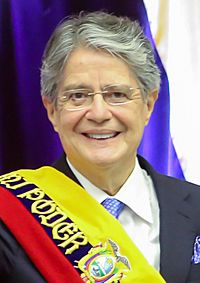 |
|
| 24 May 2021 – 23 November 2023 | |
| Alfredo Borrero (2021–2023) | |
| Election | 2021 |
|---|---|
| Seat | Carondelet Palace |
|
← Lenín Moreno • Daniel Noboa →
|
|
Transition to Power
After his election, Ecuador's financial situation improved, as many believed Lasso would work well with the International Monetary Fund (IMF). Lasso promised to continue a $6.5 billion agreement with the IMF. He also said his government would focus on working with the United States, Chile, Brazil, and Colombia. He invited Juan Guaidó, a Venezuelan opposition leader, to his inauguration instead of President Nicolás Maduro.
Lasso also announced plans to help over 400,000 Venezuelan migrants living in Ecuador. He discussed giving them temporary protected status with the Colombian President. On 15 April, Lasso said he would propose tax cuts, including removing a 2% sales tax for small businesses. His main goal after becoming president was to increase COVID-19 vaccination rates, aiming to vaccinate 9 million people in his first 100 days.
On 27 April, Lasso began naming his cabinet members, choosing many women for important roles. On 14 May, the Social Christian Party announced they would not support Lasso's government. Five days later, Lasso received his official credentials as the Constitutional President of Ecuador.
Key Actions as President
Lasso became the 47th president of Ecuador on 24 May 2021. He was the first center-right president since Gustavo Noboa (2000-2003). His first actions included expanding the Ministry of Sports and helping citizens with small debts. He also put Vice President Alfredo Borrero in charge of improving the country's healthcare and COVID response.
He announced plans to privatize some state-owned companies, including three refineries and the public telecommunications company. He also proposed tax exemptions to encourage investment in tourism.
COVID-19 Vaccination Plan
In June 2021, Lasso launched a 100-day vaccine plan to vaccinate 9 million people and help the economy recover. He worked to buy vaccines from Russia, Pfizer–BioNTech, and Oxford–AstraZeneca. By August 2021, his administration announced that millions of people had received at least one dose of the vaccine.
Lasso's party had limited influence in the National Assembly. His plans to privatize oil resources and reform labor laws faced opposition. In August 2021, he visited Mexican President Andrés Manuel López Obrador to discuss trade and Ecuador joining the Pacific Alliance. He also helped create an agreement allowing citizens from Ecuador, Colombia, Bolivia, and Peru to work and live in any of these four countries without special sponsorship.
In September 2021, Lasso proposed an economic plan that included a tax increase for the country's wealthiest citizens. He also announced a deal with the International Monetary Fund for $1.5 billion. He launched the Creation of Opportunities Act (CREO), named after his party. This law aimed to lower VAT on some products, remove inheritance tax for close family, and make hiring more flexible to attract foreign investment.
Challenges and Protests
In September 2021, a large protest took place in Quito against Lasso's government. After a deadly prison riot in Guayaquil that killed over 118 inmates, Lasso declared a state of emergency.
In October 2021, Lasso was mentioned in the Pandora Papers leak, which involved financial dealings. He stated he had legally ended any offshore accounts before the leak and cooperated with investigations. He also declared a national state of emergency due to rising violence in the country, focusing on cracking down on corruption and crime.
In December 2021, a motion to remove Lasso from office related to the Pandora Papers was rejected by the National Assembly. He then created a commission to investigate and stop prison violence.
2022 Events
After the Russian invasion of Ukraine in February 2022, Lasso stated Ecuador supported the United Nations in condemning the invasion. He visited Beijing and met with President Xi Jinping to discuss trade and debt.
In June 2022, a series of protests began against Lasso's economic policies, caused by rising fuel and food prices. Some lawmakers tried to remove him from office, but they did not get enough votes.
2023 Events
A constitutional referendum was held on 5 February 2023. Voters rejected all eight of Lasso's proposed changes to the 2008 Constitution.
In April 2023, Lasso allowed civilians to carry weapons in public places by decree. This decision was met with opposition from many groups, including indigenous organizations.
In August 2023, presidential candidate Fernando Villavicencio was assassinated. Lasso confirmed the assassination and declared a state of emergency for 60 days, deploying the military to support police. He also confirmed the election would still happen as planned.
Impeachment and Government Dissolution
In March 2023, lawmakers began impeachment hearings against Lasso. He was accused of not addressing irregularities in a contract between a state shipping company and an oil tanker company. The Constitutional Court approved the charge of embezzlement against him.
On 16 May 2023, the National Assembly officially began the impeachment process. Lasso stated the proceedings were politically motivated. The next day, Lasso dissolved the National Assembly. He used a constitutional measure called muerte cruzada (cross-death), which triggered early legislative and presidential elections. This was the first time an Ecuadorian president used this measure to avoid impeachment.
Lasso decided not to run in the new general election. In the October run-off, Daniel Noboa was elected to replace him.
Public Opinion
Lasso started his presidency with high approval ratings, around 71-75% in mid-2021. This was partly due to his government's response to the COVID-19 pandemic. However, his approval ratings dropped significantly throughout 2022 and 2023, reaching about 13.93% in 2023.
Cabinet
Post-Presidency
Before leaving office, Lasso wrote a book about his 900 days as president called "900 Days". After his presidency, he attended the inauguration of President-elect of Argentina Javier Milei in December 2023. He also attended the state funeral of former President of Chile Sebastián Piñera in February 2024.
In April 2024, Lasso stated he would not run for president again in 2025. He supported the idea of his party, CREO, putting forward a candidate. In April 2025, he launched a scholarship program for Ecuadorians to study Master's Degrees in Social Sciences.
Political Beliefs
Lasso has described himself as a "liberal" but also says he believes in "good ideas" rather than a strict ideology. He supports the idea of separate government powers to limit government and protect basic rights like freedom of the press. His think tank, Fundación Ecuador Libre, is linked to Libertarianism.
He has often spoken in favor of lower taxes, reducing government debt, and increasing the minimum wage to boost productivity and jobs. He has also committed to removing several taxes if elected president.
Lasso admires the "Silent Revolution" reforms by former Spanish Prime Minister José María Aznar. He supports more open trade with major partners like the United States and the European Union to help Ecuadorian producers export more.
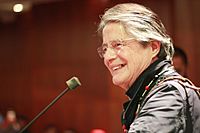
Lasso is a member of Opus Dei.
Regarding marriage between people of the same sex, he supports civil unions but believes they should be different from traditional marriage. For immigration, he proposes controls for people with criminal records but wants to make it easier for tourists and investors to enter. On environmental conservation, he has said he would keep the Yasuní Amazon reserve free from oil exploitation.
He has also been critical of the "21st-century socialism" promoted by Venezuela and Cuba.
Health Information
In 2018, Lasso had surgery on his spinal cord in the United States due to a back injury from a fall in 2013. Since then, he has used a forearm crutch. In June 2021, he had a second spinal cord surgery to improve his leg mobility.
In June 2022, Lasso was diagnosed with COVID-19. In August 2022, he received treatment for melanoma near his eye in the United States, which was successful. In February 2023, he fractured his leg in a fall and needed surgery, requiring him to use a wheelchair and walker.
Writing Career
In 2011, Lasso published a book titled Cartas a Mis Hijos (Letters to my Children). The book shares lessons from his business career and offers ideas for Ecuador's economic growth. He discusses the importance of Ecuador having more control over its own economy.
Former Prime Minister of Spain José María Aznar praised the book for its insights into development. Former Ecuadorian president Gustavo Noboa also supported the book's launch. Lasso used the ideas from this book as a basis for his presidential campaigns.
In 2012, he published another book called Otro Ecuador Es Posible (Another Ecuador Is Possible).
See also
 In Spanish: Guillermo Lasso para niños
In Spanish: Guillermo Lasso para niños


